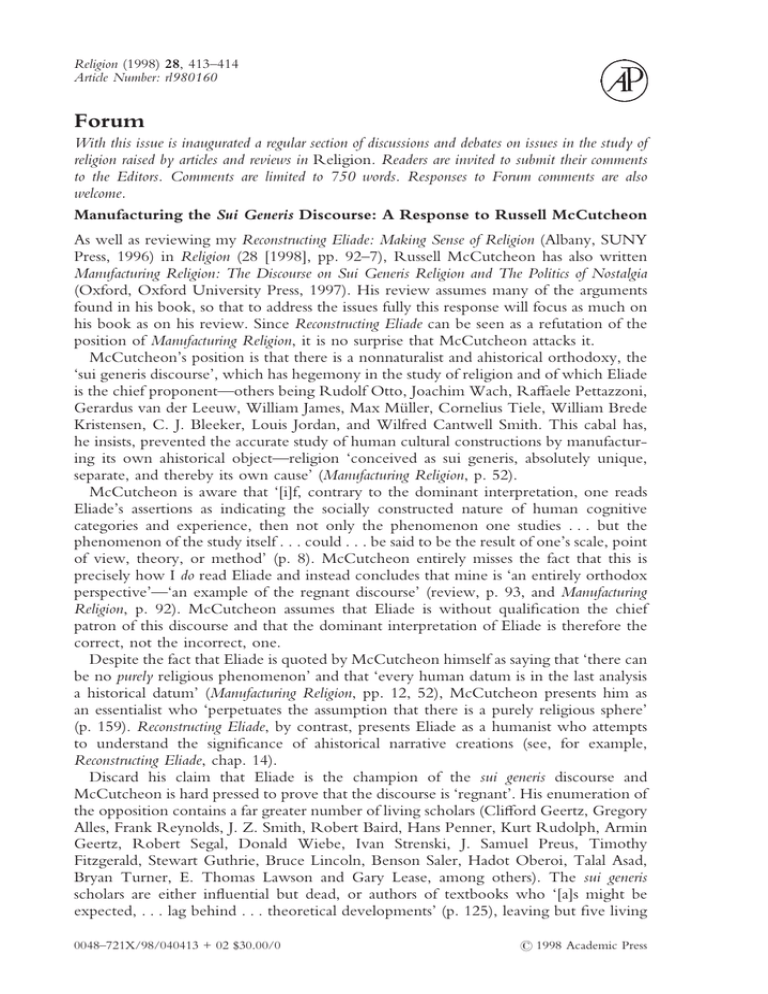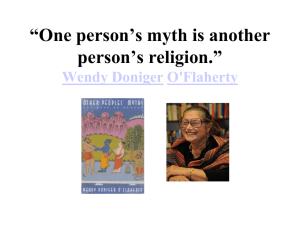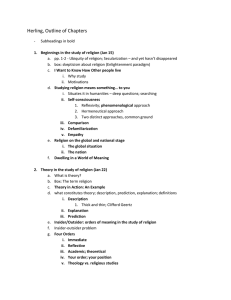Forum
advertisement

Religion (1998) 28, 413–414 Article Number: rl980160 Forum With this issue is inaugurated a regular section of discussions and debates on issues in the study of religion raised by articles and reviews in Religion. Readers are invited to submit their comments to the Editors. Comments are limited to 750 words. Responses to Forum comments are also welcome. Manufacturing the Sui Generis Discourse: A Response to Russell McCutcheon As well as reviewing my Reconstructing Eliade: Making Sense of Religion (Albany, SUNY Press, 1996) in Religion (28 [1998], pp. 92–7), Russell McCutcheon has also written Manufacturing Religion: The Discourse on Sui Generis Religion and The Politics of Nostalgia (Oxford, Oxford University Press, 1997). His review assumes many of the arguments found in his book, so that to address the issues fully this response will focus as much on his book as on his review. Since Reconstructing Eliade can be seen as a refutation of the position of Manufacturing Religion, it is no surprise that McCutcheon attacks it. McCutcheon’s position is that there is a nonnaturalist and ahistorical orthodoxy, the ‘sui generis discourse’, which has hegemony in the study of religion and of which Eliade is the chief proponent—others being Rudolf Otto, Joachim Wach, Raffaele Pettazzoni, Gerardus van der Leeuw, William James, Max Müller, Cornelius Tiele, William Brede Kristensen, C. J. Bleeker, Louis Jordan, and Wilfred Cantwell Smith. This cabal has, he insists, prevented the accurate study of human cultural constructions by manufacturing its own ahistorical object—religion ‘conceived as sui generis, absolutely unique, separate, and thereby its own cause’ (Manufacturing Religion, p. 52). McCutcheon is aware that ‘[i]f, contrary to the dominant interpretation, one reads Eliade’s assertions as indicating the socially constructed nature of human cognitive categories and experience, then not only the phenomenon one studies . . . but the phenomenon of the study itself . . . could . . . be said to be the result of one’s scale, point of view, theory, or method’ (p. 8). McCutcheon entirely misses the fact that this is precisely how I do read Eliade and instead concludes that mine is ‘an entirely orthodox perspective’—‘an example of the regnant discourse’ (review, p. 93, and Manufacturing Religion, p. 92). McCutcheon assumes that Eliade is without qualification the chief patron of this discourse and that the dominant interpretation of Eliade is therefore the correct, not the incorrect, one. Despite the fact that Eliade is quoted by McCutcheon himself as saying that ‘there can be no purely religious phenomenon’ and that ‘every human datum is in the last analysis a historical datum’ (Manufacturing Religion, pp. 12, 52), McCutcheon presents him as an essentialist who ‘perpetuates the assumption that there is a purely religious sphere’ (p. 159). Reconstructing Eliade, by contrast, presents Eliade as a humanist who attempts to understand the significance of ahistorical narrative creations (see, for example, Reconstructing Eliade, chap. 14). Discard his claim that Eliade is the champion of the sui generis discourse and McCutcheon is hard pressed to prove that the discourse is ‘regnant’. His enumeration of the opposition contains a far greater number of living scholars (Clifford Geertz, Gregory Alles, Frank Reynolds, J. Z. Smith, Robert Baird, Hans Penner, Kurt Rudolph, Armin Geertz, Robert Segal, Donald Wiebe, Ivan Strenski, J. Samuel Preus, Timothy Fitzgerald, Stewart Guthrie, Bruce Lincoln, Benson Saler, Hadot Oberoi, Talal Asad, Bryan Turner, E. Thomas Lawson and Gary Lease, among others). The sui generis scholars are either influential but dead, or authors of textbooks who ‘[a]s might be expected, . . . lag behind . . . theoretical developments’ (p. 125), leaving but five living 0048–721X/98/040413 + 02 $30.00/0 1998 Academic Press 414 Forum scholars (Daniel Pals, A. Roy Eckardt, Sung-hae Kim, Guilia S. Gasparro, and J. Alfred Martin). Although at one point McCutcheon says that ‘naturalistic discourse occupies such a marginal place in the modern study of religion’ (p. 107), at another he states that ‘the naturalistic research tradition’ is a ‘powerful aspect of the field’ (p. 124). Altogether, his survey does not constitute a convincing argument that sui generis discourse dominates the field. McCutcheon’s argument against the sui generis discourse itself is fallacious. He jumps from claims that religious data cannot be fully explained in terms of certain facts to the complete exclusion of such facts in the understanding of religion. Of the preface to Patterns in Comparative Religion, where Eliade ‘maintains that it would be futile to think that one could, for example, ‘‘explain Madame Bovary by a list of social, economic, and political facts’’’, McCutcheon declares that, ‘to exclude outright the equally legitimate understanding of the text as having . . . a political unconscious is wholly unwarranted’ (Manufacturing Religion, p. 53). But Eliade never says that the nonreligious dimension is to be excluded. Similarly, McCutcheon’s reading of van der Leeuw is of an ‘‘unarticulated and undefended assumption concerning the ahistorical or superhuman nature of religious experience’ (p. 13 [emphasis added]), and his analysis of Otto is ‘‘probably not how Otto would have phrased it’’ (p. 15). In other words, McCutcheon attacks a straw man. In fact, McCutcheon ‘manufactures’ the sui generis discourse. He makes it essential to the work of the scholars he attacks and—just as he accuses them of doing (Manufacturing Religion, p. 3)—he deemphasizes the differences between them by maintaining that ‘these scholars all share an emphasis on the personal, unique, and autonomous nature of religion’ and that ‘it is this one shared trait . . . that [is] of particular interest’ (p. 61). He insists that ‘Manea, Rennie, Olson, and Cave have all employed similar strategies as the basis for their apolitical representations of [Eliade’s] life and work’ (p. 95). Given his predisposition to interpret his texts so as to support his claims about the sui generis discourse, it is to be expected that McCutcheon fails to appreciate Reconstructing Eliade. Specifically, he does not recognise the crucial implication of the identification of the real with the sacred in chapter 2. There is no disjunction between the sacred as an external agent and the sacred as an internal experience, as he assumes (review, p. 94). Rather, the sacred is ‘an element in the structure of (human) consciousness’ (Eliade, The Quest [Chicago, University of Chicago Press, 1969] p. i). It is neither a ‘mysterious’, ‘subjective, experience, nor an ‘objective’ entity, but a classification or structuring of experience—a way of responding to entities. It is the conjunction of external and internal. Eliade’s identification of the sacred with the real and his insistence on the potential for anything to be seen as sacred militate for, not against, the recognition of historical, material and rhetorical claims and processes that elevate certain phenomena to real and sacred status. These elevations are not accomplished through purely historical and material claims. The rhetorical devices involved invariably involve nonhistorical, ‘spiritual’ or ‘transcendent’ terms as well. It is for the ubiquity of what McCutcheon calls ‘sets of privileged historical, rhetorical and political expressions’ (review, p. 96) that I argue, but that privilege is secured by the application of nonmaterial and ahistorical terms. These must be studied just as closely as the material history of religion. I applaud McCutcheon’s drive towards an accurate historiography of religions and a closer consideration of political and economic influences. However, I fear that his contribution is itself one-sided, naively privileging historicism and materialism while misrepresenting his opponents as anti-historicist and anti-materialist. Bryan Rennie, Westminster College, New Wilmington, PA 16172-001, U.S.A.





